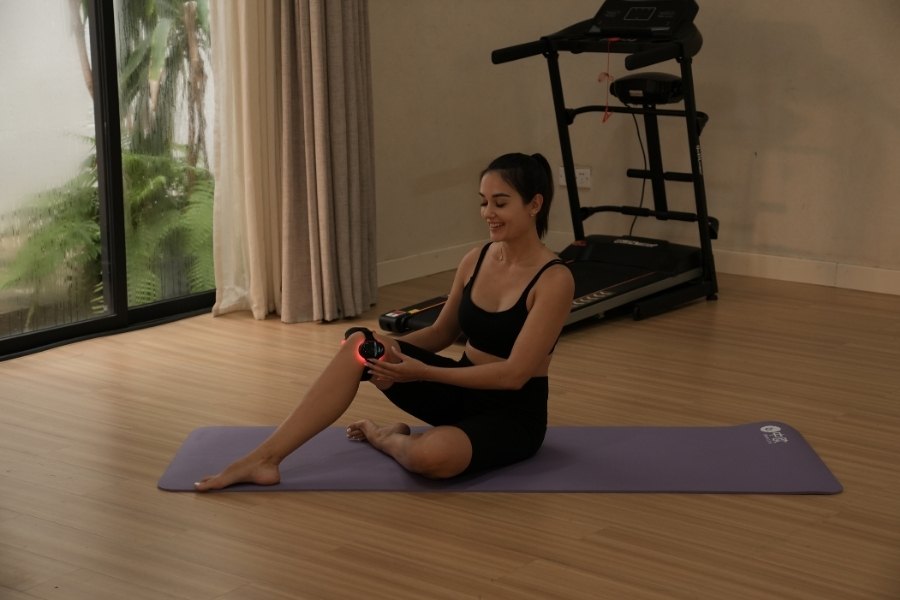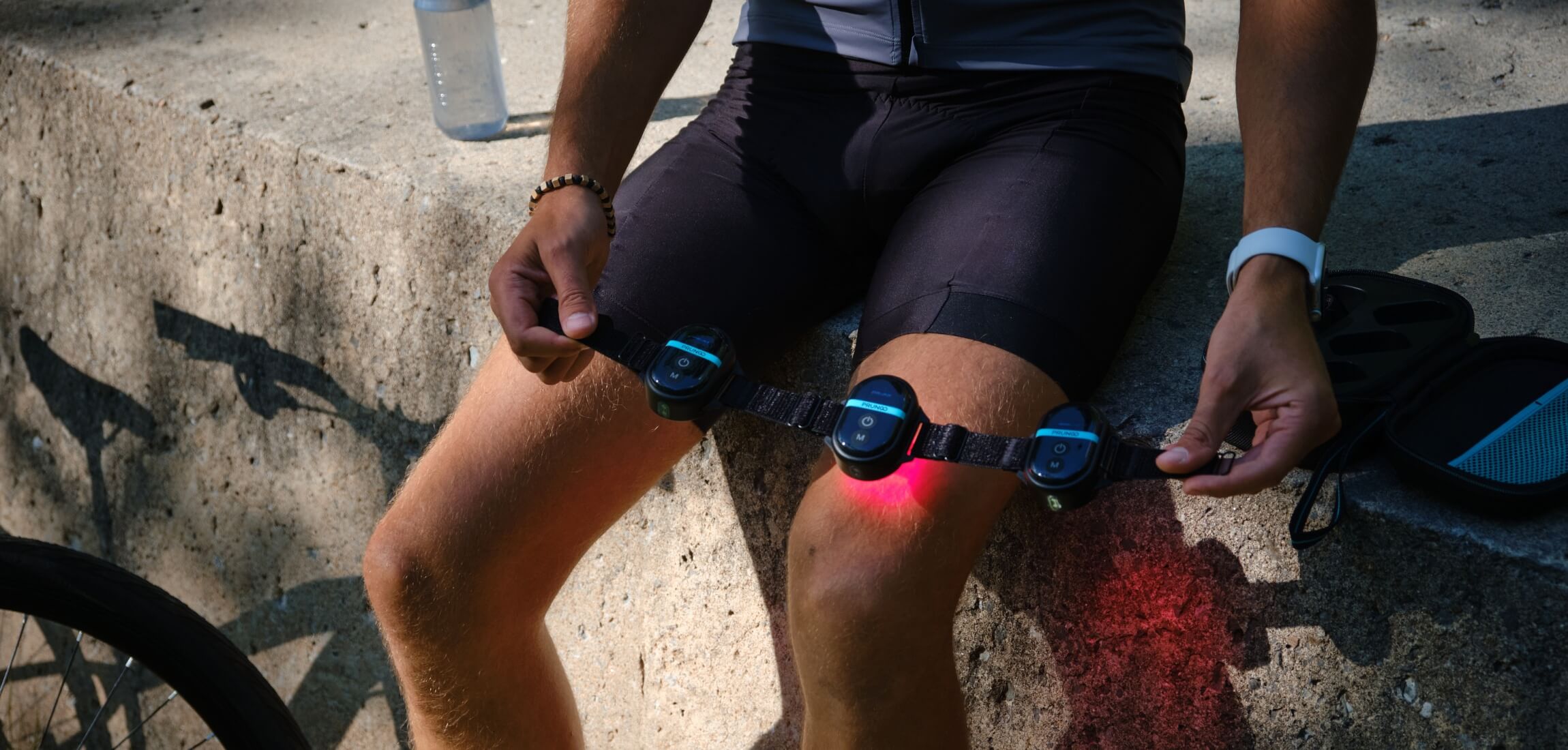Hip and knee pain are two types of pain that can impact a person’s mobility and quality of life.
While mild hip and knee pain might not affect mobility a lot, it causes great discomfort. The result is a reduced quality of life. If you experience severe pain, you might struggle to move altogether. Meaning, your mobility is impacted.
So, what causes this type of pain, and how can you relieve it effectively?
This article’ll explore the common causes of hip and knee pain. We will also discuss some effective methods that can help relieve the pain including the revolutionary red light therapy treatment.
So, let’s begin!
What are the Causes of Pain?

The hip and knee joints are among the largest and most important joints. They support your weight and allow you to maintain an active lifestyle.
Pain in these joints can stem from a single cause or multiple factors. Because these joints play a critical part in the quality of your life, it is important to understand the possible root causes of the pain. When you understand the cause of the pain, you can go for the most effective treatments.
Here are the major causes that cause hip and knee pain:
- Arthritis: Osteoarthritis and rheumatoid arthritis are two of the most common causes of hip and knee pain. Both of these conditions cause joint inflammation and stiffness which result in pain. At times, these conditions lead to sudden flare-ups that might intensify the pain for a few hours or even a few days.
- Injuries: Sprains, fractures, or ligament tears can also cause hip and knee pain. Similarly, overuse of these joints or repetitive motions, such as running or squatting, can lead to conditions like tendinitis or bursitis, causing joint pain.
- Poor Posture or Alignment: If you have a poor posture or slipped discs, it can also cause hip or knee pain. This happens because poor posture can increase strain on the joints.
- Obesity: Because both hip and knee pain bear the weight of the body, obesity is one of the most common causes of pain in these joints. The excess weight puts additional stress on these joints. Therefore, if joint pain stems from obesity losing weight is the only way to find long-term relief.
- Age-Related Degeneration: After a certain time, the cartilage cushioning the joints can wear down. The lack of this cartilage means the joints lose their smooth functionality, leading to increased friction between bones. This can cause pain, stiffness, and inflammation.
When you understand what is causing your pain, you can choose an appropriate treatment, such as red light therapy. To learn how this innovative treatment works, click How does red light therapy work for pain relief?
How to Relieve Hip and Knee Pain?
Now that you know the causes of hip and knee pain, let’s discuss the ways that can relieve you of the pain:
1. Rest and Relax Properly
Rest and relaxation are among the simplest yet most effective ways to manage joint pain. This solution is most effective if your joint pain comes from overuse or injury.
You can relax and promote healing by avoiding activities that might strain them. This helps reduce the irritation causing the discomfort. Rest is also pain relieving during flare-ups of chronic conditions like arthritis.
2. Apply Ice

Cold therapy using ice packs, helps alleviate swelling and numb the pain. To do this, apply ice to the affected area for 15-20 minutes at intervals throughout the day.
It is particularly useful to reduce stiffness after long periods of rest or physical exertion. For instance, ice application can significantly reduce inflammation and provide relief after a workout or stiffness after a night's rest.
3. Use Red Light Therapy to Relieve Pain

If you are looking for a safe, non-invasive method of pain management, red light therapy (RLT) is the ideal choice. Red light therapy devices technology combines 650nm red light and 850nm near-infrared light to penetrate deep into the skin and tissue layers, significantly relieving pain, promoting tissue repair, and reducing inflammation, especially suitable for pain management in areas such as the hips and knees.
The PRUNGO red light therapy module combines 650nm red light with 850nm near-infrared light to achieve a more comprehensive treatment effect:
The 650nm red light uses self-developed focusing lens technology to reduce the divergence angle to within 10 degrees, concentrating energy to accurately act on the surface skin and shallow tissue. It can promote collagen production, accelerate surface wound healing, and effectively reduce inflammation.
The 850nm near-infrared light is converted into polarized light that penetrates deeper with the help of medical-grade polarizer technology. Its wave vibration is consistent with biological structure, penetrating deep tissue in a spiral pattern, providing precise and powerful energy delivery. This significantly improves the efficiency of pain relief and inflammation repair.
PRUNGO medical-grade red light therapy devices combine advanced technology, simple operation, and convenience for long-term support of acute pain or chronic inflammation. It is a safe and effective solution to help you regain your health and relieve pain.
4. Exercise and Stretch

Regular exercise and stretching play a vital role in managing joint pain. Low-impact exercises such as swimming, walking, or cycling strengthen the muscles around the joints, providing better support and stability. Stretching improves flexibility and reduces stiffness, making it easier to move without discomfort.
However, make sure to only exercise when your joints won't be affected by exertion. If overuse or injury is the root cause of the pain, exercise will worsen the condition.
5. Lose Weight
If your pain stems from obesity, weight management can help alleviate hip and knee pain. Even losing a small amount of weight can significantly ease the pressure on these joints and enhance mobility.
Those with conditions like arthritis are also advised to lose weight to reduce the stress on these joints.
6. Over-the-Counter Painkillers

Over-the-counter pain medications like ibuprofen or acetaminophen can provide temporary relief from inflammation and discomfort. However, these should be used sparingly and under the guidance of a healthcare professional. If the pain persists, consulting a physician is the best way forward.
How to Avoid Joint Pain?
To avoid joint pain, maintaining a healthy weight is essential. It Is also important to incorporate low-impact exercises such as swimming, yoga, or cycling into your routine. These can strengthen the muscles around the joints, improving stability and reducing strain.
Proper posture is another critical factor that puts unnecessary stress on the joints. Maintain a proper posture and stay wary of lifting heavy loads.
If your work or hobbies involve repetitive movements, it's important to take regular breaks to prevent overuse injuries.
Summary
Hip and knee pain can impact one's quality of life and mobility. While other pain management techniques might work, red light therapy is a solution that is free of side effects. Its drug-free and non-invasive nature makes it a perfect complement to other treatments.
However, PRUNGO’s red light therapy module goes a step forward. Using it can help promote healing and help manage pain effectively.
You can also learn how the strongest red light therapy at home can help you get faster relief from joint pain.




Share:
What Red Light Therapy Devices Are FDA Approved?